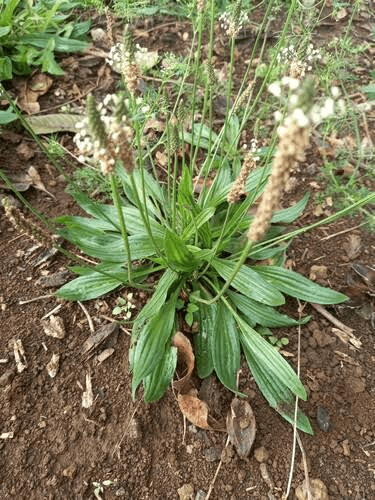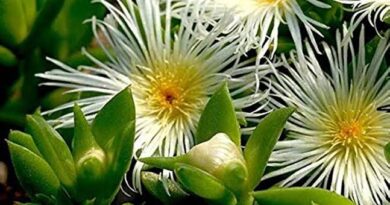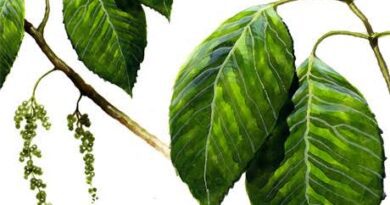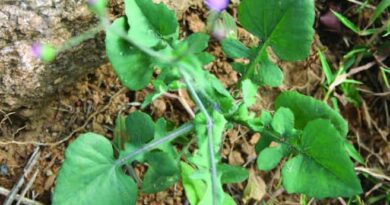16 Medicinal Health Benefits Of Plantago lanceolata (Ribwort Plantain)
Plantago lanceolata, also known as ribwort plantain or narrowleaf plantain, is a common and widespread herbaceous perennial plant in the plantain family (Plantaginaceae). It is native to Europe and Asia, but has been introduced to and naturalized in many other parts of the world, including North America, South America, Africa, and Australia.
Ribwort plantain is a rosette-forming plant, with long, narrow, lanceolate leaves that have 3-5 prominent parallel veins. The leaves are typically glabrous, but can be sparsely hairy in dry habitats.
The flower stem is leafless and can reach up to 80 cm tall. It is topped with a dense, cylindrical spike of small, white flowers. The flowers are inconspicuous, but are produced in large numbers and can be quite showy.
Ribwort plantain is a very adaptable plant and can be found in a wide range of habitats, including meadows, pastures, roadsides, wastelands, and disturbed areas. It is tolerant of drought, poor soil, and heavy trampling. This makes it a valuable forage plant for livestock and a common weed in many parts of the world.
In addition to its value as a forage plant, ribwort plantain has also been used medicinally for centuries. The leaves and seeds contain a variety of active compounds, including tannins, mucilage, and iridoid glycosides. These compounds have been shown to have anti-inflammatory, antimicrobial, and wound-healing properties.
Ribwort plantain is a valuable plant for both humans and animals. It is a nutritious forage plant for livestock, and its leaves and seeds have been used medicinally for centuries.
The Botanical Description of Plantago lanceolata
1. Morphological Features: Plantago lanceolata, commonly known as Ribwort Plantain, is a perennial herb with distinct features. It typically grows to a height of 15-45 cm. The plant is characterized by lance-shaped leaves with prominent parallel veins. These leaves form a basal rosette.
2. Leaf Structure: The leaves are dark green and measure 5-20 cm in length, with a lanceolate shape that tapers towards the tip. They are smooth and have a slightly wavy edge.
3. Flowering Stems: Ribwort Plantain produces slender, leafless flowering stems that bear small, dense spikes of tiny, inconspicuous flowers. The flowers lack true petals but have a unique structure with white stamens and green sepals.
4. Roots: The plant has a fibrous root system that anchors it securely in the soil. This root system efficiently absorbs nutrients and water.
5. Growth Habit: Plantago lanceolata typically exhibits a basal rosette growth habit, where leaves radiate outward from a central point. This growth pattern is advantageous for capturing sunlight and adapting to various environmental conditions.
The Geographic Distribution of Plantago lanceolata
Understanding the geographic distribution of Plantago lanceolata is vital for appreciating its prevalence and adaptability. This information provides insights into the regions where this plant thrives:
1. Native Range: Plantago lanceolata is native to Europe and Western Asia. It is a common sight in meadows, pastures, lawns, and along roadsides in these regions.
2. Global Dispersion: Due to its adaptability and widespread growth, Ribwort Plantain has been introduced to other parts of the world. It can now be found in North America, Australia, and various other continents, often growing in disturbed habitats.
3. Ecological Significance: Ribwort Plantain plays a significant ecological role by providing food and habitat for various insects and small mammals. Its seeds also serve as a food source for certain bird species, contributing to the biodiversity of ecosystems where it grows.
4. Cultural and Historical Significance: In its native regions, Plantago lanceolata has cultural and historical significance. It has been used for various purposes, including traditional remedies and folklore.
The Chemical Composition of Plantago lanceolata
The chemical composition of Plantago lanceolata is a key factor in its medicinal and ecological significance. It contains various compounds that contribute to its diverse uses and properties:
1. Bioactive Compounds: Ribwort Plantain is rich in bioactive compounds, including iridoid glycosides, flavonoids, and tannins. These compounds play a crucial role in its medicinal applications and therapeutic effects.
2. Mucilage Content: The plant is known for its high mucilage content, particularly in its seeds. Mucilage is a gel-like substance that swells in water, forming a soothing and protective coating. This property makes Ribwort Plantain valuable in various health applications.
3. Nutritional Value: The leaves of Plantago lanceolata are rich in vitamins and minerals, providing essential nutrients for overall health. They are particularly high in vitamin K, making them a nutritious addition to the diet.
4. Medicinal Components: The plant contains specific compounds like aucubin and allantoin, which possess anti-inflammatory, antimicrobial, and wound-healing properties. These components are key in its traditional and modern medicinal uses.
The botanical description, geographic distribution, and chemical composition of Plantago lanceolata is essential for recognizing its ecological and cultural significance and appreciating its diverse applications in traditional and modern contexts.
Read Also: 7 Medicinal Health Benefits Of Trichostema lanceolatum (Vinegarweed)
The Medicinal Health Benefits Of Plantago lanceolata (Ribwort Plantain)

1. Anti-Inflammatory Properties: Plantago lanceolata is renowned for its potent anti-inflammatory effects, which make it valuable for conditions like arthritis and joint pain. Compounds in the plant help reduce inflammation and alleviate discomfort.
2. Respiratory Health: Ribwort Plantain has a history of use for supporting respiratory health. Its natural soothing properties can help relieve coughs, congestion, and other respiratory issues, providing valuable relief for breathing difficulties.
3. Digestive Aid: The plant is known for its ability to soothe digestive discomfort, including indigestion and mild stomach issues. Its gentle nature makes it a trusted remedy for improving digestion and reducing gastrointestinal distress.
4. Wound Healing: Plantago lanceolata is famous for its wound-healing properties. When applied topically, it can aid in the healing of minor wounds, cuts, and skin irritations, promoting a faster recovery.
5. Skin Health: Ribwort Plantain is a go-to remedy for skin-related issues. It can alleviate itching, rashes, and insect bites, contributing to overall skin health with its natural soothing effect.
6. Antioxidant Effects: The plant contains antioxidants that help protect cells from oxidative stress. These antioxidants play a crucial role in overall health by neutralizing harmful free radicals.
7. Respiratory Relaxant: It acts as a respiratory relaxant, which can help ease conditions like asthma, where bronchodilation is essential in reducing bronchospasms and improving airflow.
8. Anti-Anxiety Effects: Some individuals find that Ribwort Plantain has mild anti-anxiety effects, contributing to relaxation and stress reduction for improved mental and emotional well-being.
9. Relief from Minor Pain: Ribwort Plantain’s analgesic properties provide relief from minor pain, making it a natural alternative to over-the-counter pain relievers.
10. Traditional Herbal Remedy: Plantago lanceolata holds a long history of use in herbal medicine, being recognized for its versatile properties and serving as a staple in traditional remedies for centuries.
11. Nutritional Value: The leaves of Ribwort Plantain are rich in vitamins and minerals, particularly vitamin K, making them a nutritious addition to one’s diet and contributing to overall health and vitality.
12. Gastrointestinal Comfort: Ribwort Plantain helps soothe gastrointestinal discomfort, making it suitable for addressing issues such as bloating, gas, and mild stomach pain.
13. Cardiovascular Support: Some studies suggest that Plantago lanceolata may offer cardiovascular benefits, including potential support for heart health and blood pressure regulation.
14. Immune System Boost: The antioxidant content in Ribwort Plantain strengthens the immune system, helping the body defend against infections and illnesses.
15. Urinary Health: Ribwort Plantain is known for its mild diuretic properties, supporting urinary health and reducing water retention.
16. Allergy Relief: Ribwort Plantain can help alleviate allergy symptoms, including hay fever. Its anti-inflammatory properties reduce allergic reactions and nasal congestion.
The Methods of Usage to Achieve the Provided Health Benefits Of Plantago lanceolata (Ribwort Plantain)
1. Herbal Teas and Infusions: Preparing herbal teas and infusions from Ribwort Plantain leaves is a common method to harness its health benefits. These beverages are soothing and effective for respiratory and digestive issues.
2. Topical Applications: Crushed Ribwort Plantain leaves can be applied topically to wounds, insect bites, or skin irritations for wound healing and skin health.
3. Dietary Incorporation: Ribwort Plantain leaves can be added to salads, providing a nutritious addition to one’s diet. They can also be used in soups or as a culinary herb.
4. Herbal Tinctures: Tinctures made from Ribwort Plantain are available, offering a concentrated form for medicinal use. These tinctures are convenient and can be taken orally or added to other remedies.
5. Herbal Compresses: Ribwort Plantain leaves can be used to create herbal compresses for localized relief. These compresses can be applied to specific areas of the body, such as the chest for respiratory relief or to insect bites for skin comfort.
The Side Effects Of Using Plantago lanceolata Medicinal Plant
1. Skin Sensitivity: In rare cases, individuals with sensitive skin may experience skin irritation when applying Ribwort Plantain topically. It’s advisable to conduct a patch test before extensive use.
2. Allergic Reactions: Some people may be allergic to Ribwort Plantain. If you experience symptoms like itching, swelling, or difficulty breathing, discontinue use and seek medical attention.
3. Gastrointestinal Upset: While Ribwort Plantain can soothe gastrointestinal discomfort for most, excessive consumption may lead to mild stomach upset in some individuals.
4. Diuretic Effects: Ribwort Plantain’s mild diuretic properties can lead to more frequent urination. This effect may be undesirable for some individuals.
5. Herb-Drug Interactions: If you are taking medications or have underlying health conditions, consult with a healthcare professional before using Ribwort Plantain to avoid potential interactions and adverse effects.
6. Dosage Considerations: Ensure that you follow recommended dosages and usage instructions, as excessive use may lead to side effects or diminished effectiveness.
Ribwort Plantain, with its wide array of health benefits and versatile usage methods, is a valuable herbal remedy. However, it’s essential to use it with an awareness of potential side effects, cultural significance, and dosage considerations for a safe and effective experience.
Read Also: 7 Medicinal Health Benefits Of Ribes divaricatum (Straggly Gooseberry)
The Scientific Research and Studies of Plantago lanceolata (Ribwort Plantain)

1. Pharmacological Investigations: Extensive scientific studies have been conducted to delve into the pharmacological properties of Plantago lanceolata, exploring its effects on the human body and its potential applications in medicine. These investigations have provided valuable insights into its medicinal uses.
2. Anti-Inflammatory Research: Scientific research has specifically focused on understanding the anti-inflammatory properties of Ribwort Plantain, shedding light on how it can effectively reduce inflammation, which is crucial for addressing various health conditions.
3. Respiratory Health Trials: Clinical studies have investigated Ribwort Plantain’s efficacy in promoting respiratory health and relieving symptoms such as coughs and congestion. These trials provide scientific evidence of its benefits in this regard.
4. Digestive Aid Studies: Research has been conducted to assess Ribwort Plantain’s role as a digestive aid. Its soothing properties on the gastrointestinal tract have been examined, contributing to our understanding of its digestive benefits.
5. Wound Healing Investigations: Clinical trials and research have explored the plant’s wound-healing properties. This body of work has helped validate the traditional use of Ribwort Plantain in promoting the healing of minor wounds, cuts, and skin irritations.
6. Antioxidant Potential: Research has explored the antioxidant properties of Ribwort Plantain and its impact on overall health. Understanding its antioxidant potential contributes to a deeper knowledge of its role in maintaining well-being.
7. Herbal Medicine Studies: Ribwort Plantain plays a prominent role in herbal medicine, and scientific studies have assessed its safety and efficacy in various herbal formulations. This research forms the basis for its inclusion in herbal remedies.
8. Safety and Toxicology Research: Studies have been conducted to evaluate the safety and toxicology of Ribwort Plantain, providing important information for its proper use and ensuring it is free from harmful effects.
The Safety Precautions and Recommendations In Using Plantago lanceolata (Ribwort Plantain) Medicinal Plant
1. Consultation with Healthcare Professionals: Before using Ribwort Plantain for medicinal purposes, it is crucial to consult with healthcare professionals, especially if you have underlying health conditions or are taking medications. They can provide personalized advice based on your health status.
2. Dosage Regulation: Ribwort Plantain should be used in recommended dosages to prevent potential side effects or complications. Overconsumption can lead to undesirable outcomes.
3. Allergy Considerations: Individuals with known allergies to plants in the Plantaginaceae family or related species should exercise caution when using Ribwort Plantain to avoid allergic reactions.
4. Topical Application Precautions: When applying Ribwort Plantain topically, it is advisable to perform a patch test to check for skin sensitivity and potential irritation.
5. Interaction with Medications: Ribwort Plantain may interact with certain medications. If you are on prescribed drugs, consult with a healthcare provider to avoid potential interactions.
6. Cultural and Ethical Considerations: When using Ribwort Plantain, particularly in traditional or cultural contexts, it’s essential to be respectful of the plant’s significance and cultural practices. Proper etiquette and ethics should be maintained.
FAQs About Plantago lanceolata (Ribwort Plantain) Medicinal Plant
Q1: Is Ribwort Plantain Safe for Everyone to Use?
A: While Ribwort Plantain is generally safe for most individuals, those with known allergies to related plant species should be cautious. It’s recommended to perform a patch test before using it extensively.
Q2: Can Pregnant or Nursing Women Use Ribwort Plantain Safely?
A: Pregnant and nursing individuals should exercise caution when using Ribwort Plantain. It’s advisable to consult with a healthcare professional before use to ensure safety during these sensitive periods.
Q3: Can Ribwort Plantain Be Used as a Natural First Aid Remedy?
A: Ribwort Plantain is often used as a natural first aid remedy for minor cuts, insect bites, and skin irritations. It can be a valuable addition to a natural first aid kit.
Q4: How Should Ribwort Plantain Be Stored for Longevity and Effectiveness?
A: To maintain the plant’s effectiveness, store it in a cool, dry place, away from direct sunlight. Proper storage can help preserve its medicinal properties.
Q5: Can Ribwort Plantain Help with Allergic Reactions and Hay Fever?
A: Some individuals use Ribwort Plantain to alleviate allergy symptoms, including hay fever. Its anti-inflammatory properties may help reduce allergic reactions and nasal congestion.
Q6: Can Ribwort Plantain Be Used as a Smoking Cessation Aid?
A: Ribwort Plantain is not recommended as a smoking cessation aid. Other specialized smoking cessation methods and products are more suitable for this purpose.
Q7: Are There Different Species of Plantago With Varied Medicinal Properties?
A: Yes, there are several species of Plantago, each with its unique characteristics. The specific species used may impact the medicinal properties and potential uses.
Q8: Can Ribwort Plantain Leaves Be Used in Culinary Dishes?
A: Some species of Ribwort Plantain have culinary uses, with their leaves added to salads, soups, or other dishes. However, it’s essential to identify the specific species and follow culinary guidelines.
Q9: Is There Ongoing Scientific Research on Ribwort Plantain’s Medicinal Applications?
A: Yes, ongoing research continues to explore the various medicinal applications and potential benefits of Ribwort Plantain. New findings contribute to our understanding of its uses.
These FAQs provide a comprehensive overview of various aspects related to the use of Plantago lanceolata (Ribwort Plantain) as a medicinal plant, ensuring readers have essential information for safe and effective utilization.
Read Also: Cordyline Care 101: A Complete Guide









